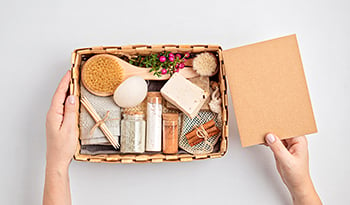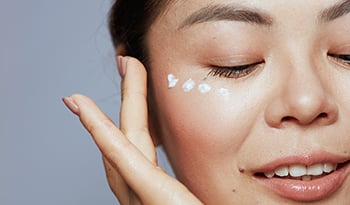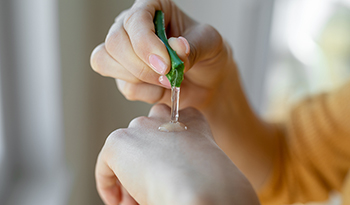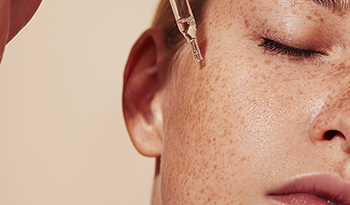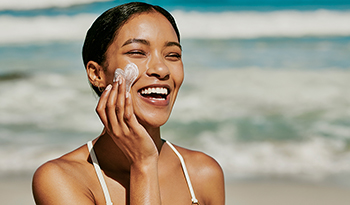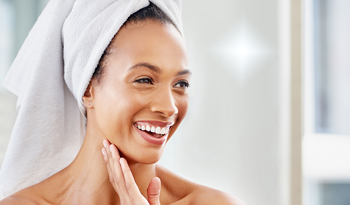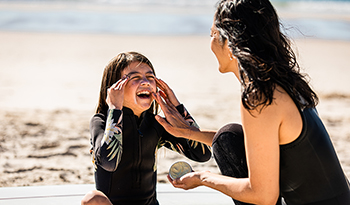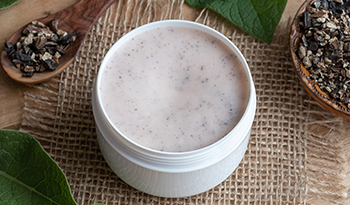Her neyse, Sülfatlarla Sorun Nedir?

Son yıllarda sağlıklı yaşama doğru muazzum bir hareket oldu. Kendilerini “doğal” olarak lanse eden kişisel bakım ürünleri çok popülerdir, ancak “doğal” mutlaka “daha iyi” anlamına gelmez.
İnternette tüketiciler tarafından kolayca erişilebilen yanlış bilgilerin bolluğu, belirli bileşenlerden asılsız korku yarattı ve bunların zararlı olduğu iddiaları bilim tarafından kanıtlanmadı veya desteklenmiyor. “Kimyasal” kelimesinin olumsuz bir çağrışımı vardır, ancak size antibiyotikler gibi kimyasalların hayat kurtardığını ve zehirli sarmaşık gibi doğal bir maddenin alerjik kontakt dermatitin en yaygın suçlularından biri olduğunu hatırlatmama izin verin.
Kişisel ve güzellik ürünlerinde, özellikle saç ürünlerinde “sülfatsız” etiketini her yerde görüyoruz. Ne yapıyorlar ve sağlığımız için gerçekten kötü mü? Bir dermatolog olarak, genel halkı doğru kanıta dayalı bilgilerle düzgün bir şekilde eğitmek istiyorum, bu yüzden bazı efsaneleri çürütelim.
Sülfatlar Nedir?
Sülfatlar, yüzey aktif maddeler adı verilen bir kimyasal türüdür. Su, kir ve yağ arasındaki yüzey gerilimini azaltmak için şampuanlara ve temizleyicilere konurlar, böylece ürünlerin daha kolay köpürmesini ve köpürmesini sağlar. Bu, şampuanın kafa boyunca daha kolay yayılmasını sağladığı için arzu edilir.
Sülfatlar ayrıca ürünlerdeki aktif bileşenlerin daha iyi nüfuz etmesine yardımcı olarak saçınızda bulunan kir, yağ ve kimyasalları gidermede daha etkili hale getirir. Yağlı veya yağlı saçları olanlar için, saç derisini daha etkili bir şekilde temizleyebildiği için sülfat içeren şampuan istenebilir.
Kişisel güzellik ürünlerinde, tipik olarak şampuanlarda bulunan en yaygın sülfat formları sodyum lauril sülfat ve sodyum lauret sülfattır.
Sülfatlarla İlgili Sorun
Çok etkili temizleyiciler olduklarından, sülfat içeren şampuanlar doğal yağı çok fazla temizleyebilir ve saç derimizi ve saçımızı kuru ve kırılgan hissettirebilir. Sülfatlar potansiyel olarak bazı kullanıcılarda tahrişe ve hatta dermatite neden olabilir, ancak - ve bu önemlidir - çoğu insan onları gayet iyi tolere eder.
Sülfatlar, kişisel bakım ürünleri olarak kullanıldığında ve yutulmazsa kişisel sağlık riski oluşturmaz. Sülfatların kanserojen olduğu endişesi bilimsel olarak kanıtlanmamıştır.
Saç Ürünlerimde Sülfatlardan Kaçınmalı mıyım?
Buna bağlı. Bu kategorilerden birine girerseniz, sülfatlardan kaçınmak isteyebilirsiniz:
- Hassas cildiniz, kişisel egzama geçmişiniz veya kuru saç deriniz varsa, sülfatsız şampuan kullanmayı düşünebilirsiniz. Sülfat bazlı ürünler potansiyel bir tahriş edici veya alerjen görevi görebilir. Atopik dermatit, sedef hastalığı veya kafa derisinin iltihaplandığı şiddetli seboreik dermatit gibi rahatsızlıkları olan kişilerde, bu ürünler kafa derisini daha da şiddetlendirebilir ve daha belirgin kaşıntı, kızarıklık, sızıntı ve dökülmeye yol açabilir.
- Kuru veya kırılgan saçları olan kişiler de sülfatlardan kaçınmalıdır. Bu şampuanlar saçın doğal yağını sıyırarak kuruluğu, saç kırılmasını ve kıvrılmayı artırabilir.
- Kimyasal olarak işlenmiş saçları olanlar, renklendirme veya kimyasal işleme yoluyla olsun, sülfatlardan kaçınmalıdır. Fikir yukarıdakiyle aynıdır. Bu bireyler daha kuru saçlara sahip olma eğilimindedir. Sülfatlar zaten zarar görmüş saçlarınıza daha fazla stres katacaktır. Ek olarak, sülfatlar saç rengini daha çabuk yıkayabilir, bu da istenmez.
- Amerikan Dermatoloji Akademisi ayrıca rosacealı herkesin iltihabı tetiklediği bilindiği için sülfat bazlı kişisel bakım ürünlerinden kaçınmasını önerir. Rosacealı bireyler yanabilen ve burunda, yanaklarda ve çenede sivilce benzeri çıkıntılarla pembe yanaklar olarak ortaya çıkabilen hassas cilde sahiptir. Sülfatların semptomları tetiklediği ve kızarıklığı arttırdığı gösterilmiştir.
Sülfat Alerjim Var mı?
Sülfat içeren şampuanınıza tepki verebileceğinizden endişeleniyor musunuz? İşte aramanız gereken bazı belirti ve semptomlar:
- Kızarıklık, kaşıntı veya şişmiş cilt: Bu genellikle göz kapağı, alın, yanaklar, boyun ve özellikle boynun arkasında bulunur. Bu genellikle durulama işlemi sırasında cilde temas eden şampuandan kaynaklanır. Saç derimiz cildimizden çok daha dayanıklıdır, bu nedenle ironik olarak, sülfatlara karşı gerçek bir alerjiniz olsa bile tepki vermeyebilir.
- Kötüleşen cilt koşulları: Egzama veya sedef hastalığı gibi bir kafa derisi rahatsızlığınız varsa ve sülfat içeren şampuan kullandıktan sonra kötüleşiyorsa, suçlu sülfatlar olabilir. Döküntü, tekrarlanan kullanımdan hemen sonra veya birkaç gün içinde gelişebilir.
Ürünlerinizdeki sülfatlara tepki verdiğinizden şüpheleniyorsanız, bunun sülfatlar mı yoksa başka bir şey mi olduğunu keşfetmenize yardımcı olması için bir dermatologla konuşmalısınız.
Sülfatlar Hakkında Önerilerim
Genel olarak, potansiyel sağlık riski nedeniyle değil, çoğunlukla saç ve saç derisinin sağlığı için sülfatsız şampuan kullanmanızı öneririm. Tıbbi olarak, kafa derisini etkileyen enflamatuar rahatsızlıkları olanlar, önceden var olan kafa derisi hastalıklarının daha da kötüleşmesini önlemek için sülfat içermeyen şampuandan da yararlanacaklardır.
Çok yağlı saç derisine sahip olanlar veya gıcırtılı bir temizlik hissi isteyenler için sülfat içeren şampuanlar kir, yağ ve kalıntıları etkili bir şekilde temizlemede en iyi işi yapar. Kimyasal olarak daha iyi bir alternatif yoktur.
Kuru, kırılgan veya yıpranmış saçları olan birçok kişi kuruluğu önlemek için saçlarını daha az sıklıkta yıkar. Bu, saç gövdesini korumak için yararlı olsa da, seyrek saç yıkamadan kaynaklanan yağ, sebum ve kalıntı birikmesi tıkanmış saç köklerine, kafa derisi iltihabına, kepeklerin kötüleşmesine, kaşıntıya ve hatta saç dökülmesine neden olabilir. Bu nedenle, bu insanlar için saç tipleri için özel olarak formüle edilmiş çok yumuşak, sülfatsız bir şampuan kullanarak haftada 2-3 kez saçları yıkamanızı öneririm. Şampuanlarken, sadece saç derisine uygulayın, saçtan kaçının ve daha sonra kondisyonladığınızdan emin olun.
Ayrıca, özellikle kimyasal işlem görmüş veya kuru, kırılgan saçları olanlar için haftada bir kez derin bakım tedavisi kullanmanızı öneririm.
Favori Sülfatsız Saç Ürünlerim
Sülfatsız saç ürünleri için en sevdiğim iki marka Living Proof ve Moroccanoil. Bu çizgiler, çeşitli saç ihtiyaçları için çeşitli şampuan ve saç kremlerine sahiptir. Saçlarımı sık sık balayajlarım, bu yüzden oldukça zarar gördü. Genellikle kimyasal olarak işlenmiş ve kuru saçlar için özel ürünler kullanıyorum. Bu şampuanların daha az kuruduğunu ve saç kremlerinin saçlarım için daha nemlendirici olduğunu buldum. Saçımı haftada sadece iki kez yıkarım - aşırı saç yıkama saç derisini ve saçı kurutabilir.
Pureology özellikle saçlarını boyayanlar için tavsiye ettiğim başka bir çizgi. Şampuan serisi, yıkama sırasında rengin ve canlılığın korunmasına yardımcı olmak için özel olarak formüle edilmiştir.
Bugün piyasada sülfatsız ürünler içeren birçok marka bulunmaktadır. Bu ürünlerin kendi başlarına sülfat içermese de, alternatif olarak benzer yapılandırılmış kimyasallara sahip olabileceklerini belirtmek önemlidir. Saç ürünlerinizdeki bileşenler ve bunların saç ve saç deriniz üzerindeki etkileri konusunda endişeleriniz varsa, teşhis ve önerilerde yardım için lütfen dermatoloğunuza danışın.
FERAGAT:SAĞLIK MERKEZİ tanı koymayı hedeflememektedir...
















































































 İçindekiler
İçindekiler



